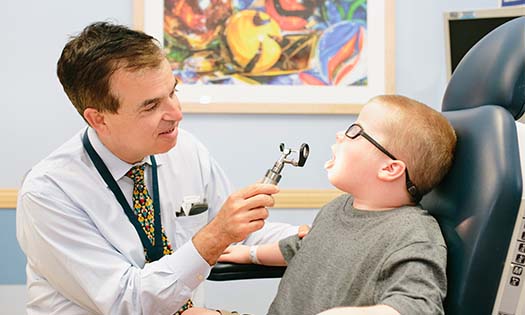Two Children’s Health researchers are among the co-authors of a new national study on the impact of national guideline implementation of post-tonsillectomy care across 43 children’s hospitals, published in the July issue of Pediatrics, the official journal of the American Academy of Pediatrics.
The study, co-authored by Children’s Health Vice President of Quality and Chief Quality Officer Rustin B. Morse, M.D. and pediatric hospitalist, Vineeta Mittal, M.D., both of whom are associate professors of pediatrics at UT Southwestern Medical Center, found that after national guidelines issued by the American Academy of Otolaryngology and Head and Neck Surgery (AAOHNS) in 2011, perioperative care processes improved by increased use of steroids and reduced use of antibiotics, as the guidelines suggested. However, post-surgical visits for pain increased modestly.
Of the 112,000 child tonsillectomy patients ages 1 to 18 that were studied over a four-year period (January 2009 to January 2013), an average of 8.6 percent experienced a post-surgical visit for complications such as bleeding, vomiting, dehydration and infection during the study period. The rate of revisits for most complications, including bleeding, remained level over the duration of the study; however, the rate of post-surgical revisits due to pain increased from 8.2 percent to 9.0 percent in the period that followed publication of the guidelines.
“This study is important for several reasons. First, it demonstrates the ability for guidelines to help improve care through standardization. For example, in this case, there was a remarkable decrease in unnecessary antibiotic use. Second, the study highlights improvement opportunities to ensure the best care possible after discharge, specifically by optimizing pain control and ensuring hydration,” Dr. Morse said. “At Children’s Health, we encourage families to be fully engaged in their child’s discharge process, and in the case of patients undergoing tonsillectomies, this means making sure they understand how best to manage their child’s pain to ensure he or she is comfortable drinking and will stay well hydrated.”
Ron Mitchell, M.D., assistant chair and co-author of the Clinical Practice Guideline: Tonsillectomy in Children, also welcomes the study’s finding about the decrease in use of unnecessary antibiotics. He does, however, emphasize that the choice of pain medicines prescribed after tonsillectomy have changed after the guideline was published.
“We are using Motrin routinely and are rarely using codeine,” said Mitchell, who is also division director at Children’s Health and chief of pediatric otolaryngology at UT Southwestern Medical Center. “This is in keeping with the FDA’s recommendations that were made after the clinical guidelines were published. At Children’s Health, we are committed to the best care possible after tonsillectomy by minimizing pain and using safe and effective medication”
Tonsillectomy is one of the most common surgeries performed on children. Children’s Health – Including Children’s Medical Center Dallas and Children’s Medical Center Plano have the largest group of fellowship-trained pediatric ear, nose and throat (ENT) specialists in North Texas. They also only work with fellowship-trained pediatric anesthesiologists. The Pediatric Otolaryngology division is led by Mitchell, as well as Romaine Johnson, M.D., who is an assistant professor of pediatric otolaryngology at UT Southwestern. Children’s ENT department performed over 2,100 tonsillectomies in 2014.
Children’s Health offers parents and caregivers the following recommendations for post-surgical care after a tonsillectomy:
Ask questions about your child’s post-operative, in-home care following a tonsillectomy.
To manage pain in a child who has undergone a tonsillectomy, administer an over-the-counter (OTC) pain reliever such acetaminophen or ibuprofen as instructed by your doctor. Do not administer codeine. While it is a pain reliever it can cause life-threatening breathing problems after tonsillectomy.
Dehydration is a leading cause for hospitalization. Make sure that your child stays amply hydrated by drinking plenty of fluids.
Antibiotics should not be administered routinely for prevention of infection.
The AAOHNS guidelines call for administering the anti-inflammatory drug dexamethasone during surgery; specific instructions for in-home, post-surgical care; monitoring for complications due to bleeding following surgery; and the elimination of prescribing antibiotics before or after surgery due to their ineffectiveness in reducing post-tonsillectomy complications. While the research showed an improvement in the overall process for tonsillectomy surgical care when the guidelines are followed, the authors concluded that further research and quality improvement efforts are needed to understand the increase in revisits due to pain. One possible reason may be the FDA’s recommended elimination of codeine, which can cause life-threatening breathing problems after tonsillectomy. An over-the-counter alternative such as acetaminophen or ibuprofen should be used per doctor’s instructions.


